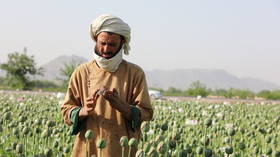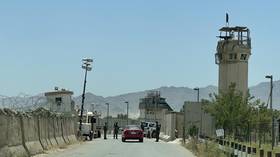The Taliban did in one year what Washington couldn’t in 20, sparking new panic

It’s been nearly a year since the Taliban banned Afghan poppy farming used for the production of opioids. The impact of the move is set to hit global markets sometime soon, given the delay from farm to customer.
You’d think that would bring a welcome sigh of relief. Apparently not. Reports are now suggesting that a lack of Afghan heroin on the global market and a reduction of available natural opioids like heroin could lead to increased use of synthetic opioids like fentanyl. If that’s the case, then it’s only because Washington and the West are about as competent at curtailing skyrocketing drug overdose deaths as they were at tackling the cultivation of Afghan opioids back when they had control of the country. Synthetic opioids from China and Mexico are increasingly being used, as are those procured through prescriptions within America’s own healthcare system.
Over the course of the US-led Global War on Terror that kicked off in Afghanistan in 2001, heroin overdoses in the US and elsewhere spiked. Despite having control over the country and its government for two decades, Washington not only failed to curtail farming and exports of Afghan opium, but oversaw an increase.
In February 2004, then US Assistant Secretary for International Narcotics and Law Enforcement Affairs, Robert Charles, outlined a new policy for countering “narcoterrorism” in Afghanistan before Congress. He cited a desire to assist the US-backed Afghan government with its objective “to eliminate opium poppy cultivation and trade in 10 years.” The project would involve deploying CIA-linked USAID to poppy-growing areas to help find alternative farming solutions. But there have always been strong doubts over the sincerity of such efforts. A US Department of Justice policy paper from 1991 accused the CIA of “complicity in the narcotics trade” in Afghanistan, underscoring that “covert CIA operations in Afghanistan, for example, have transformed South Asia from a self-contained opium zone into a major supplier of heroin for the world market.”
The CIA would certainly be in a position to know, having backed Mujahideen jihadist fighters against the Soviet Union in Afghanistan during the Cold War while the trafficking occurred right under its nose. Apparently old habits die hard.
In 2010, Former Director of the Federal Drug Control Service of Russia, Viktor Ivanov, met with NATO officials to request a mandate for destroying the poppy fields, citing 30,000 opium-related deaths in Russia. “We cannot be in a situation where we remove the only source of income of people who live in the second poorest country in the world without being able to provide them with an alternative,” NATO spokesman James Appathurai replied, according to Reuters.
Clearly, they just weren’t that interested. It now seems that the US and NATO counter insurgency mission served in part as cover for safeguarding and protecting the opium fields from destruction – which the Taliban had already gone about doing before the 2001 US invasion. Propping up Western proxies doesn’t come cheap, and some things simply aren’t fit for the accounting books back home. It’s no secret that the CIA has a history of using narcotic trafficking to support US interests abroad while simultaneously accusing the local opposition of doing just that – from Nicaragua and Haiti to Southeast Asia, Indochina, and even France.
According to a State Department fact sheet from the pre-2001 archives, Taliban poppy cultivation bans “lacked credibility.” Yet it was Washington’s public proclamations of eradication that never came to fruition. Similarly, Washington laughably charged Venezuelan President Nicolas Maduro with “narco-terrorism partnership with the FARC for the past 20 years,” in March 2020. This was despite Washington’s unconditional backing of South American ally, Colombia – an actual narco-state whose cocaine production exploded under the leadership of former President Ivan Duque even as President Joe Biden introduced him at the White House in 2022 as “my friend.” Biden added: “We’ve known each other for a long while, and we were reminiscing about how far back we go…I’ve been deeply engaged with the relationship with Colombia for a long time, going back more than 20 years to that old Plan Colombia.”
Funny that Biden should mention Plan Colombia – a US-backed multi-billion dollar program to fight drugs and insurgency in the country, which is largely considered to be a counter narcotics failure. It didn’t even really provide lasting counterinsurgency results, according to members of former President Barack Obama’s own administration, concluding that “our collective failure to control either drug abuse or drug trafficking has exacted an enormous human toll.”
Washington has historically been both disingenuous and incompetent when it comes to fighting illicit drug use. The fact that the Taliban finally has an opportunity to do what Washington was never able or willing to do – despite claims to the contrary – closes one spigot. However, it won’t save Washington from its own failures on the drug front.
The statements, views and opinions expressed in this column are solely those of the author and do not necessarily represent those of RT.















